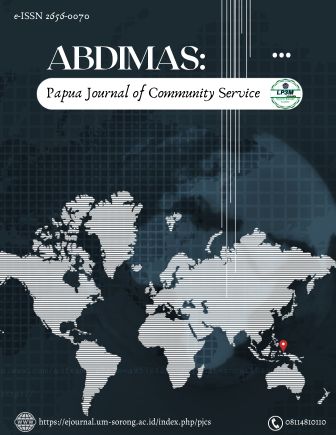Konseling Orientasi Masa Depan Dan Potensi Peserta Didik SMU IT HB di Semarang
DOI:
https://doi.org/10.33506/pjcs.v1i2.1395Keywords:
Orientasi Masa Depan, Konseling, PsikotesAbstract
Konseling bertujuan mengetahui dan membantu menyelesaikan masalah yang terjadi dalam proses pendidikan dan dapat dimanfaatkan bagi pengembangan peserta didik, tindakan kelas oleh guru dan keputusan penting lainnya. Pemahaman tentang hasil psikotes dan hasil pelatihan OMD ini diharapkan dapat meningkatkan kesejahteraan peserta didik di sekolah. Analisis dilakukan dengan membuat profile sesuai tema dalam orientasi masa depan, aspek kecerdasan dan Hasil Konseling. Hasil dari Penelitian menunjukan Tingkat kecerdasan peserta didik 80 % berada pada taraf rata-rata dan terdapat 3 orang pada kecerdasan di atas rata-rata., 50 % peserta didik tidak mengambil jurusan yang sesuai dengan hasil Psikotes pada pengabdian. Hampir seluruh peserta menggunakan kata Dream, mimpi sebagai kata kunci untuk mengembangkan rencananya. Tujuan-tujuan yang dikembangkan selain tujuan individual juga tujuan-tujuan Sosial. Sebagian besar belum mengetahui langkah-langkah apa yang harus diambil bagi masa depannya, namun maping yang dibuat cenderung lebih luas dan lengkap.
References
Aro, K.T.,Aunola, K., & Nurmi, J.E., (1991). Personal Goals During Emerging Adulthood, A 10-Year Follow-Up. Journal of Adolescent Research. Vol, X, No 10.
Havighurst, R. J. (1984). Perkembangan Manusia dan Pendidikan. Diterjemahkan: Firmansyah. Bandung: Jemmars. Heinonen, H., Aro, A.R., Aalto, A.M., &Uutela, A.(2004). Is the evaluation of the global quality of life determined by emotional status? Journal Quality of Life Research,13 (8),1347–1356.
Hurlock, E. (2004). Psikologi Perkembangan. Terjemahan. Jakarta: PT Gramedia Pustaka Jembarwati, O. (2011). Peran Harapan Keberhasilan dan Persepsi Perilaku 51 Interpersonal Guru terhadap Kesejahteraan emosi Siswa. (Unpublished thesis).Gadjah Mada University. Yogyakarta.
Johnson, R.A., &Wichern, D.W.(2002). Applied multivariate statistical analysis.Fifth Edition. New Jersey : Prentice Hall Inc. Lent, W. (2007).Restoring emotional wellbeing a theoretical model.Dalam Handbook of cancer survivorship. Journal of Behavioral Health Services, 3, 231-247. Linley, P.A., & Joseph, S. (Ed.). (2004). Positive psychology in practice. New Jersey : John Wiley & Sons, Inc. Monks, F. J., Knoers, A. M., &Haditono, S. R. (2002).
Psikologi perkembangan: pengantar dalam berbagai bagiannya. Yogyakarta: Gadjah Mada University Press. Nurmi, J. E. (1989). Development of Orientation to the future during early adolescence: A Four-year Longitudinal study and two crosssectional comparisons. International Journal of Psychology, 24, 195-214.
Seginer, R,. (2010). Future Orientation: Developmental and Ecological Perspectives. The Springer Series on Human Exceptionaly. USA: Springer US Reis, H. T., Sheldon, K. M., Gable, S. L., Roscoe, J., & Ryan, R. M. (2000).Dialy well-being: The role of autonomy, competence, and relatedness. South African Journal of Education, 26 (4), 419-435.
Santrock, J. W. (2002). Life-span development: PerkembanganMasaHidup . Jilid 2.Edisi 5.Alih ahasa :Chusairi, & Damanik. Jakarta: Erlangga. Seginer, R, (2009).
Future Orientation .Developmental and Ecological Perspectives. USA: Springer Science+Business Media. Snyder, C.R., Feldman, D.B., Shorey, H.S., & Rand, K.L.(2002). Hopeful choices.a school counselor’s guide to hope theory. Journal of Professional School Counseling, 5(5), 298-308. Snyder, C.R., & Lopez, S.J. (2002).
Downloads
Published
Issue
Section
License
Authors who publish with this journal agree to the following terms:
Authors retain copyright and grant the journal right of first publication with the work simultaneously licensed under a Creative Commons Attribution-ShareAlike 4.0 International License. that allows others to share the work with an acknowledgment of the work's authorship and initial publication in this journal.
Authors are able to enter into separate, additional contractual arrangements for the non-exclusive distribution of the journal's published version of the work (e.g., post it to an institutional repository or publish it in a book), with an acknowledgment of its initial publication in this journal.
Authors are permitted and encouraged to post their work online (e.g., in institutional repositories or on their website) prior to and during the submission process, as it can lead to productive exchanges, as well as earlier and greater citation of published work

Papua Journal of Community Service is licensed under a Creative Commons Attribution-ShareAlike 4.0 International License



